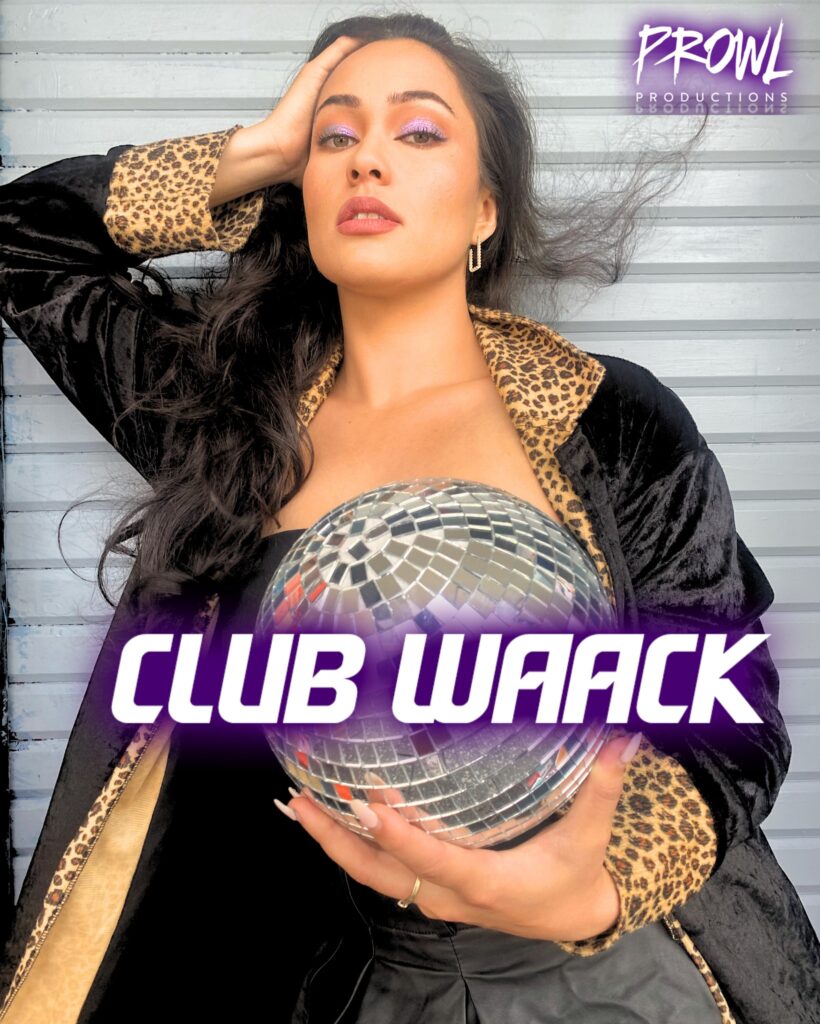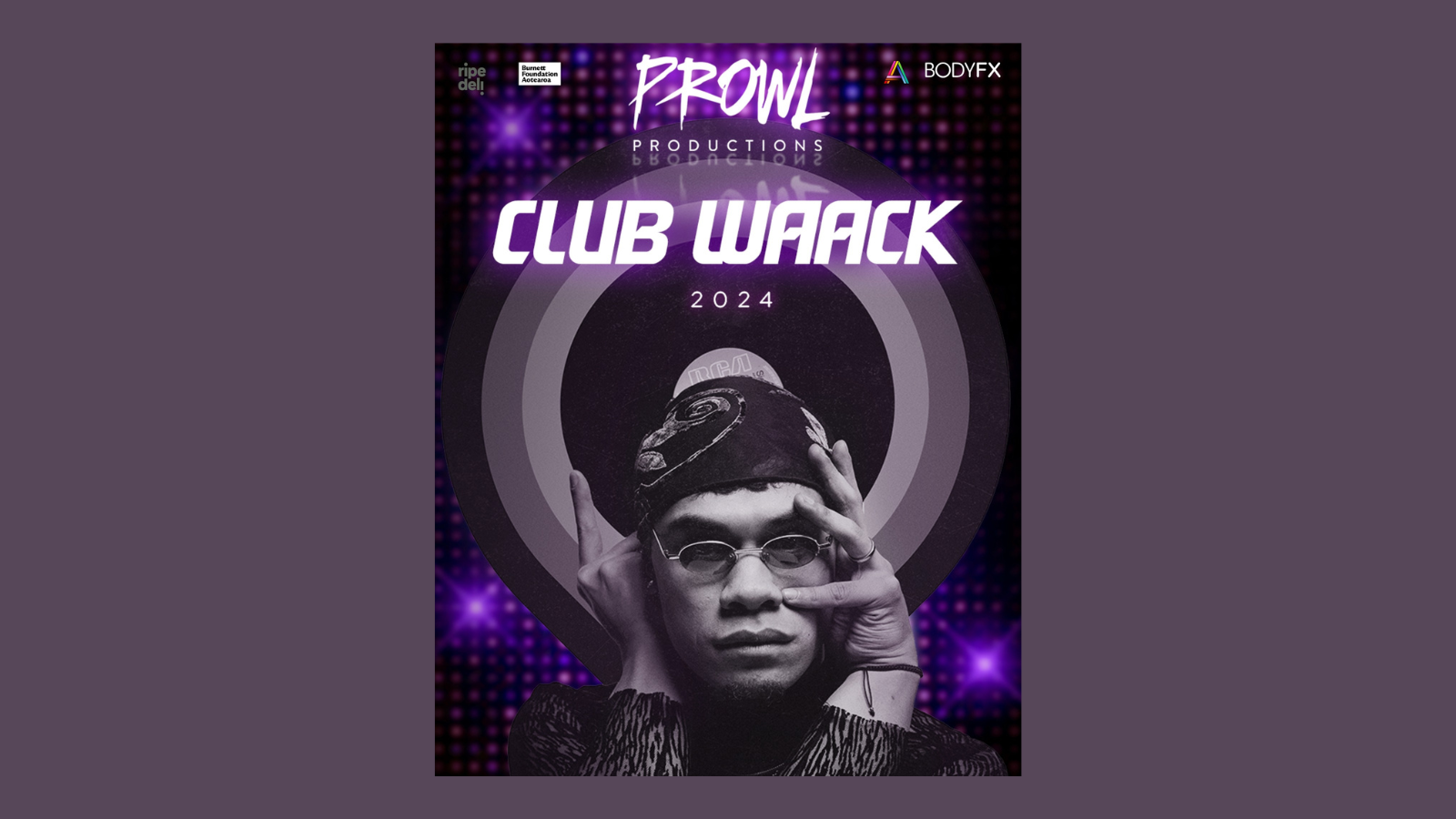As part of Pride Festival’s programming for 2024 was the vaguely described, Club Waack. Promising an immersive theatre experience my curiosity was piqued, I lined up outside Raynham Park’s discrete entrance on Saturday 3 February and joined the queue that sprawled out into Karangahape Road down the pavement heading towards St Kevin’s Arcade. Ten minutes later, with a fluorescent-coloured band slapped around my wrist, I was transported from the blistering night that Tāmaki had put on for us, into a Raynham Park re-imagined as the fictional ‘Club Waack’.
The house lights were off and a red strobe light created a seductive mood as graphics were projected onto the longer walls of the corridor-like room.
With easily 50 people in the room, and more spilling into the corners of Club Waack, we all congregated and formed an awkward dance circle reminiscent of primary school discos past—leaving a blank space in the centre of our oval as a dare for people to strut their stuff and leave their mark on the Club Waack dance floor.
And strut their stuff they did.
An athletic rollerblader (Tyler Matheson) commanded the centre space, capturing the attention of the crowd with dips, intricate floorwork and even a flip and cartwheel thrown in for good measure. A little dance cameo from Club Waack’s own co-director Andrew Cornish himself, and a flirtatious lap dance given from one member of the audience to another. It was clear a frenzy was building, and the village had assembled to not just experience the show but be the show.
Soon after the groovy tunes from resident mood-maker DJ Blush quietened down, the red lights transitioned to a warm magenta and The Dream Girls disco hit ‘One Night Only’ started playing. All eyes turned towards the half of the room where a disco ball previously perched on the ceiling dropped lower, reflecting the light show into tiny squares across the crowd. Emerging out of the audience, Auckland’s self-proclaimed darling drag queen Ivanna Drink took to the vacant stage to introduce herself as the MC for the evening. With every spin and point of her finger during her energetic solo, she further strengthened the spell, asserting that Raynham Park was no more and that this was well and truly the magical and extravagant Club Waack.
Soon the ground rules for the immersive theatre experience were set (whatever the performers ask you, the answer is ‘yes’), and a mindful silence for the genocide happening in Palestine was collectively shared amongst the crowd. Then, a dip in the lighting signalled the end of the pre-show and the audience moved from one end of the room to the other. At the rear end of the room, Mama Doll (expertly played by Gabriel Halatoa) struts onto the stage and fires out a rhythmic and confident spoken-word-like monologue placing us in the gritty, glittery and glamorous world of Club Waack.
What ensues is a moving story of community and collective resistance as Mama Doll, the owner of Club Waack, and her dancers navigate the SPCE’s (Standards Protecting Communities Everywhere) efforts to further exclude Club Waack and force her members out of one of the only safe spaces they have forged for themselves. As noted by a review of an earlier iteration of the show, Club Waack moves between telling a local story of queer people building a community in an Aotearoa that refuses to accept them, and a more global narrative of queer struggle against discriminatory and exclusionary policies—all because the state feared (and in some respects continues to fear) queerness like the plague.
I echo sentiments from that same review also as there are elements that could be further strengthened i.e. re-visiting each character and ensuring they don’t come across as flat caricatures— whether through strengthening dialogue or being mindful of how each character is characterised. Where my view of Club Waack differs, however, is that while this theatre show is a work of art, it is also an example of the Indigenous theatre-maker making public their growing leadership practice and their service to the villages and communities that they make for. Club Waack is an act of village building and collective remembering.
Theatrically, the show undoubtedly finds its strength in the clean, precise and full-bodied dance sequences and the moments of humour that are peppered throughout the show. Two weeks on from experiencing Club Waack’s immersive theatre offer, two things still ring in my ear: firstly, the quip from Mama Doll to Tigress (played by Hayley Walters-Tekahika) in one of their rehearsal scenes, “I want everyone as warm as a gay sauna,” and secondly, the howl this line elicited from one enthusiastic audience member.

But more profoundly, while I would acknowledge that while there are undeniably areas of growth in the show, where Club Waack is at its most potent is when it cleverly activates and calls back, and on, the notion of whakapapa. Throughout the show are examples of how this is an active remembering of, and a celebration for, all the QBIPOC that make up the whakapapa of creativity that Club Waack draws from.
The projected video showed the gay West Coast Black and Latino forefathers of waacking, our own legendary Vogue Dance Crew led by Stephen Gray and battle footage from Aotearoa’s first waacking company, Jaackers. This is us, and we are powerful. The show also highlights how, for queer people of colour in Aotearoa, it’s been necessary to use whatever global or local tools available, in this case, the street dance form waacking, to survive and potentially thrive.
Using a queer tagata moana-based lens to view this work from, I can critically appreciate how at stake for Andrew Cornish and Hayley Walters-Tekahika, who both whakapapa Māori, is the underlying whakataukī, “Kia whakatōmuri te haere whakamua.” (1) Club Waack for all its glitter and glamour, is not just about fun, but about highlighting all the giant’s shoulders these performers of Club Waack stand on to see as far and to dance as audaciously as they do.
This is the work of Indigenous theatre-makers and art practitioners, and the responsibility that they hold with the tools that they have. (2) Through immersive theatre, I not only got to watch the vibrant community around Prowl Productions mobilise, but I also got to be a part of it—going so far as being invited up to make a fool of myself in the aforementioned rehearsal scene by taking part in a waacking dance class. My own public embarrassment aside, the joy and pride I felt in the room was palpable, and not something I have often felt or experienced in more traditional theatre offerings.
What also must be highlighted is the moving performance Gabriel Halatoa put on. Their offering had depth and one could tell that, in Mama Doll, Gabriel was calling upon all the strength, tenacity and tenderness of their own queer mothers and fathers.
Clear as the shimmer and glitter from the outfits on show that night, this space was forged undoubtedly as a safe space for QBIPOC to be themselves, in all their joy, queerness and strength. For all its minor faults, the intent and impact are clear and the often said, “The whole is greater than the sum of its parts,” rings true. Or to use the words of Tigress, “If you can’t understand the music, then you don’t understand the dance.”
(1) English translation: I walk backwards into the future with my eyes fixed on my past.
(2) Applying a rationale that Dr. Michelle Johansson sets out in: Johansson, M. (2024). Audacious dancing: Growing Pasifika leaders for South Auckland through the performing arts. Art/Research International, 8(2), 547-562.
Featured photos courtesy of Prowl Productions.



